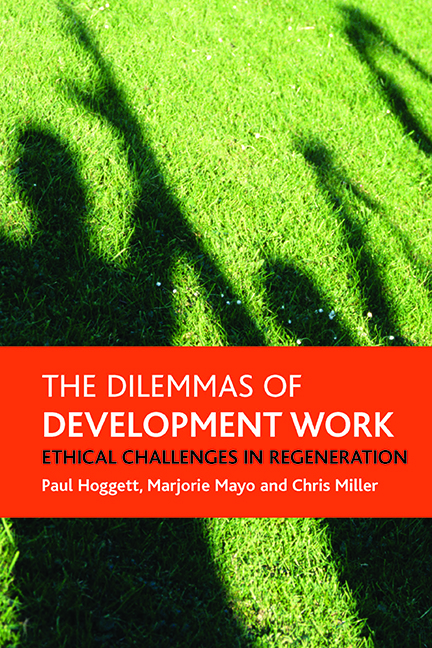five - Workers’ values and commitments
Published online by Cambridge University Press: 21 January 2022
Summary
More than a job
As we saw in the previous chapter, our conversations with development workers revealed a number of important insights about how they related to their work. For example, for the great majority there had not been a conscious career choice to get into development work; rather, it seemed to be more of an expression of who they were, that is, part of their identity. Moreover, many development workers had stayed committed and close to practice despite opportunities for promotion into management. It seemed that keeping in touch with practice performed a variety of functions – renewing their energy, inspiring their imagination, arousing their curiosity, rekindling their anger, provoking reflection and learning. Finally, we also noticed that it was precisely this strength of commitment to the work which often created problems as it became a source of stress, leading, for instance, to workers taking work home and threatening their ability to give time to their partner or children.
Motivation
Working in the public services is ‘more than just a job’. In a survey of over 400 managers in the UK public, private and voluntary sectors, Steele (1999) found that the desire to ‘benefit the community’ was the most frequently cited goal of public sector managers. As she states, ‘it provides a common theme and sense of purpose for people working in local government, health and the police’ (1999, p 13). In contrast, managers in the private sector, for whom ‘the prosperity of their organisation’ was the most frequently ranked goal, ranked this objective the lowest.
The idea of different work ethics and motivations can be traced through the organisational studies literature at least as far back as Amitai Etzioni's classic study in which he contrasted what he called ‘calculative’ or instrumental to ‘moral’ forms of involvement in organisations (Etzioni, 1961). More recently some of the same themes reappeared in Julian Le Grand's examination of motivation and agency in welfare systems (Le Grand, 2003) in which he explored the relationship between incentive systems and the promotion of altruistic as opposed to self-interested forms of human behaviour.
In Motivation, Agency and Public Policy, Le Grand (2003) sketched the recent history of public services in Britain in terms of a number of radical shifts.
- Type
- Chapter
- Information
- The Dilemmas of Development WorkEthical Challenges in Regeneration, pp. 77 - 96Publisher: Bristol University PressPrint publication year: 2008

